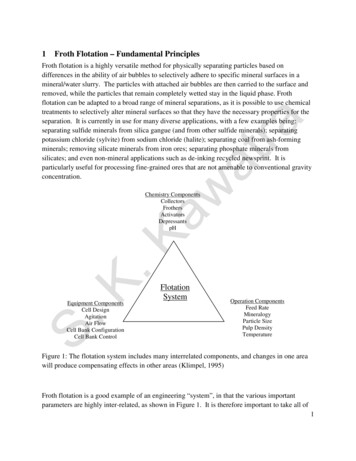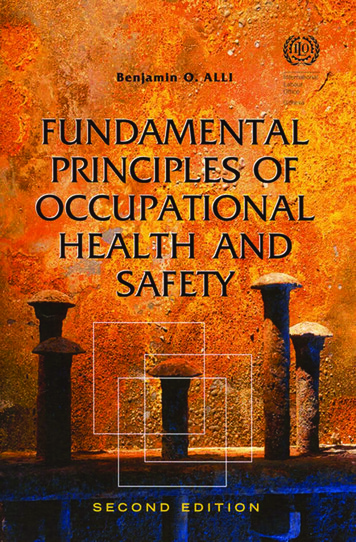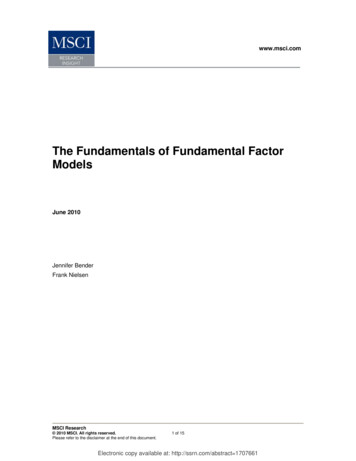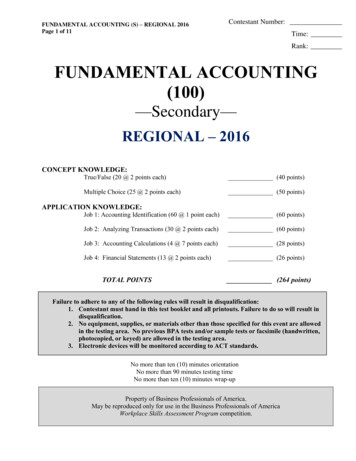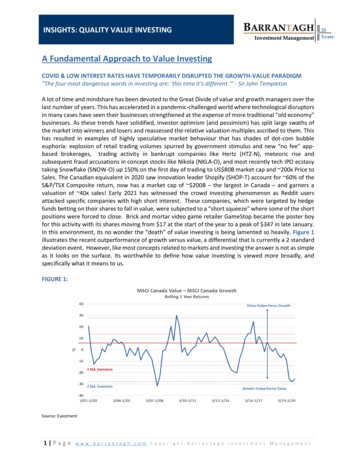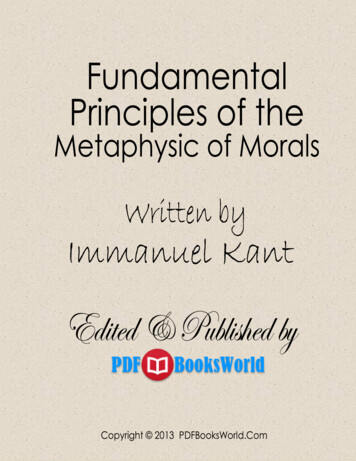
Transcription
0
FundamentalPrinciples of theMetaphysic of MoralsByImmanuel KantTranslated byThomas Kingsmill AbbottThis eBook is designed, edited and published by PDFBooksWorld and can be accessed & downloadedfor personal reading by registered members of PDFBooksWorld at http://www.pdfbooksworld.com.Though the text, illustrations and images used in this book are out of copyright, this unique PDF formattededition is copyrighted. Readers of this book can share and link to pages of our website through blogs andsocial networks, however the PDF files downloaded from our website shall not be stored or transmitted inany form for commercial purpose.Disclaimer: This edition is an electronic version of a public domain book, which was originally written many decades ago. Hencecontents found in this eBook may not be relevant to the contemporary scenarios. This book shall be read for informative andeducational purpose only. This eBook is provided ‘AS-IS’ with no other warranties of any kind, express or implied, including but notlimited to warranties of merchantability or fitness for any purpose.1
ContentsFundamental Principles of the Metaphysic ofMorals . 1Contents . 2PREFACE . 3TRANSITIONFROMTHECOMMONRATIONALKNOWLEDGE. 11OF MORALITY TO THE PHILOSOPHICAL . 112
PREFACEAncient Greek philosophy was divided into three sciences:physics, ethics, and logic. This division is perfectly suitable to thenature of the thing; and the only improvement that can be madein it is to add the principle on which it is based, so that we mayboth satisfy ourselves of its completeness, and also be able todetermine correctly the necessary subdivisions.All rational knowledge is either material or formal: the formerconsiders some object, the latter is concerned only with the formof the understanding and of the reason itself, and with theuniversal laws of thought in general without distinction of itsobjects. Formal philosophy is called logic. Material philosophy,however, has to do with determinate objects and the laws to whichthey are subject, is again twofold; for these laws are either laws ofnature or of freedom. The science of the former is physics, that ofthe latter, ethics; they are also called natural philosophy andmoral philosophy respectively.Logic cannot have any empirical part; that is, a part in which theuniversal and necessary laws of thought should rest on groundstaken from experience; otherwise it would not be logic, i.e., acanon for the understanding or the reason, valid for all thought,and capable of demonstration. Natural and moral philosophy, onthe contrary, can each have their empirical part, since the formerhas to determine the laws of nature as an object of experience; thelatter the laws of the human will, so far as it is affected by nature:the former, however, being laws according to which everything3
does happen; the latter, laws according to which everything oughtto happen. Ethics, however, must also consider the conditionsunder which what ought to happen frequently does not.We may call all philosophy empirical, so far as it is based ongrounds of experience: on the other band, that which delivers itsdoctrines from a priori principles alone we may call purephilosophy. When the latter is merely formal it is logic; if it isrestricted to definite objects of the understanding it is metaphysic.In this way there arises the idea of a twofold metaphysic- ametaphysic of nature and a metaphysic of morals. Physics willthus have an empirical and also a rational part. It is the same withEthics; but here the empirical part might have the special name ofpractical anthropology, the name morality being appropriated tothe rational part.All trades, arts, and handiworks have gained by division of labour,namely, when, instead of one man doing everything, each confineshimself to a certain kind of work distinct from others in thetreatment it requires, so as to be able to perform it with greaterfacility and in the greatest perfection. Where the different kinds ofwork are not distinguished and divided, where everyone is a jackof-all-trades, there manufactures remain still in the greatestbarbarism. It might deserve to be considered whether purephilosophy in all its parts does not require a man speciallydevoted to it, and whether it would not be better for the wholebusiness of science if those who, to please the tastes of the public,are wont to blend the rational and empirical elements together,mixed in all sorts of proportions unknown to themselves, and whocall themselves independent thinkers, giving the name of minutephilosophers to those who apply themselves to the rational part4
only- if these, I say, were warned not to carry on twoemployments together which differ widely in the treatment theydemand, for each of which perhaps a special talent is required,and the combination of which in one person only producesbunglers. But I only ask here whether the nature of science doesnot require that we should always carefully separate the empiricalfrom the rational part, and prefix to Physics proper (or empiricalphysics) a metaphysic of nature, and to practical anthropology ametaphysic of morals, which must be carefully cleared ofeverything empirical, so that we may know how much can beaccomplished by pure reason in both cases, and from whatsources it draws this its a priori teaching, and that whether thelatter inquiry is conducted by all moralists (whose name is legion),or only by some who feel a calling thereto.As my concern here is with moral philosophy, I limit the questionsuggested to this: Whether it is not of the utmost necessity toconstruct a pure thing which is only empirical and which belongsto anthropology? for that such a philosophy must be possible isevident from the common idea of duty and of the moral laws.Everyone must admit that if a law is to have moral force, i.e., to bethe basis of an obligation, it must carry with it absolute necessity;that, for example, the precept, "Thou shalt not lie," is not valid formen alone, as if other rational beings had no need to observe it;and so with all the other moral laws properly so called; that,therefore, the basis of obligation must not be sought in the natureof man, or in the circumstances in the world in which he is placed,but a priori simply in the conception of pure reason; and althoughany other precept which is founded on principles of mereexperience may be in certain respects universal, yet in as far as itrests even in the least degree on an empirical basis, perhaps only5
as to a motive, such a precept, while it may be a practical rule, cannever be called a moral law.Thus not only are moral laws with their principles essentiallydistinguished from every other kind of practical knowledge inwhich there is anything empirical, but all moral philosophy restswholly on its pure part. When applied to man, it does not borrowthe least thing from the knowledge of man himself(anthropology), but gives laws a priori to him as a rational being.No doubt these laws require a judgement sharpened byexperience, in order on the one hand to distinguish in what casesthey are applicable, and on the other to procure for them access tothe will of the man and effectual influence on conduct; since manis acted on by so many inclinations that, though capable of theidea of a practical pure reason, he is not so easily able to make iteffective in concreto in his life.A metaphysic of morals is therefore indispensably necessary, notmerely for speculative reasons, in order to investigate the sourcesof the practical principles which are to be found a priori in ourreason, but also because morals themselves are liable to all sortsof corruption, as long as we are without that clue and supremecanon by which to estimate them correctly. For in order that anaction should be morally good, it is not enough that it conform tothe moral law, but it must also be done for the sake of the law,otherwise that conformity is only very contingent and uncertain;since a principle which is not moral, although it may now andthen produce actions conformable to the law, will also oftenproduce actions which contradict it. Now it is only a purephilosophy that we can look for the moral law in its purity andgenuineness (and, in a practical matter, this is of the utmost6
consequence): we must, therefore, begin with pure philosophy(metaphysic), and without it there cannot be any moralphilosophy at all. That which mingles these pure principles withthe empirical does not deserve the name of philosophy (for whatdistinguishes philosophy from common rational knowledge is thatit treats in separate sciences what the latter only comprehendsconfusedly); much less does it deserve that of moral philosophy,since by this confusion it even spoils the purity of moralsthemselves, and counteracts its own end.Let it not be thought, however, that what is here demanded isalready extant in the propaedeutic prefixed by the celebrated Wolfto his moral philosophy, namely, his so-called general practicalphilosophy, and that, therefore, we have not to strike into anentirely new field. Just because it was to be a general practicalphilosophy, it has not taken into consideration a will of anyparticular kind- say one which should be determined solely from apriori principles without any empirical motives, and which wemight call a pure will, but volition in general, with all the actionsand conditions which belong to it in this general signification. Bythis it is distinguished from a metaphysic of morals, just asgeneral logic, which treats of the acts and canons of thought ingeneral, is distinguished from transcendental philosophy, whichtreats of the particular acts and canons of pure thought, i.e., thatwhose cognitions are altogether a priori. For the metaphysic ofmorals has to examine the idea and the principles of a possiblepure will, and not the acts and conditions of human volitiongenerally, which for the most part are drawn from psychology. Itis true that moral laws and duty are spoken of in the generalmoral philosophy (contrary indeed to all fitness). But this is noobjection, for in this respect also the authors of that science7
remain true to their idea of it; they do not distinguish the motiveswhich are prescribed as such by reason alone altogether a priori,and which are properly moral, from the empirical motives whichthe understanding raises to general conceptions merely bycomparison of experiences; but, without noticing the difference oftheir sources, and looking on them all as homogeneous, theyconsider only their greater or less amount. It is in this way theyframe their notion of obligation, which, though anything butmoral, is all that can be attained in a philosophy which passes nojudgement at all on the origin of all possible practical concepts,whether they are a priori, or only a posteriori.Intending to publish hereafter a metaphysic of morals, I issue inthe first instance these fundamental principles. Indeed there isproperly no other foundation for it than the critical examinationof a pure practical Reason; just as that of metaphysics is thecritical examination of the pure speculative reason, alreadypublished. But in the first place the former is not so absolutelynecessary as the latter, because in moral concerns human reasoncan easily be brought to a high degree of correctness andcompleteness, even in the commonest understanding, while onthe contrary in its theoretic but pure use it is wholly dialectical;and in the second place if the critique of a pure practical reason isto be complete, it must be possible at the same time to show itsidentity with the speculative reason in a common principle, for itcan ultimately be only one and the same reason which has to bedistinguished merely in its application. I could not, however,bring it to such completeness here, without introducingconsiderations of a wholly different kind, which would beperplexing to the reader. On this account I have adopted the title8
of Fundamental Principles of the Metaphysic of Morals instead ofthat of a Critical Examination of the pure practical reason.But in the third place, since a metaphysic of morals, in spite of thediscouraging title, is yet capable of being presented in popularform, and one adapted to the common understanding, I find ituseful to separate from it this preliminary treatise on itsfundamental principles, in order that I may not hereafter haveneed to introduce these necessarily subtle discussions into a bookof a more simple character.The present treatise is, however, nothing more than theinvestigation and establishment of the supreme principle ofmorality, and this alone constitutes a study complete in itself andone which ought to be kept apart from every other moralinvestigation. No doubt my conclusions on this weighty question,which has hitherto been very unsatisfactorily examined, wouldreceive much light from the application of the same principle tothe whole system, and would be greatly confirmed by theadequacy which it exhibits throughout; but I must forego thisadvantage, which indeed would be after all more gratifying thanuseful, since the easy applicability of a principle and its apparentadequacy give no very certain proof of its soundness, but ratherinspire a certain partiality, which prevents us from examining andestimating it strictly in itself and without regard to consequences.I have adopted in this work the method which I think mostsuitable, proceeding analytically from common knowledge to thedetermination of its ultimate principle, and again descendingsynthetically from the examination of this principle and itssources to the common knowledge in which we find it employed.The division will, therefore, be as follows:9
1 FIRST SECTION. Transition from the common rationalknowledge of morality to the philosophical.2 SECOND SECTION. Transition from popular moral philosophyto the metaphysic of morals.3 THIRD SECTION. Final step from the metaphysic of morals tothe critique of the pure practical reason.10
TRANSITION FROM THE COMMONRATIONAL KNOWLEDGEOF MORALITY TO THE PHILOSOPHICALNothing can possibly be conceived in the world, or even out of it,which can be called good, without qualification, except a goodwill. Intelligence, wit, judgement, and the other talents of themind, however they may be named, or courage, resolution,perseverance, as qualities of temperament, are undoubtedly goodand desirable in many respects; but these gifts of nature may alsobecome extremely bad and mischievous if the will which is tomake use of them, and which, therefore, constitutes what is calledcharacter, is not good. It is the same with the gifts of fortune.Power, riches, honour, even health, and the general well-beingand contentment with one's condition which is called happiness,inspire pride, and often presumption, if there is not a good will tocorrect the influence of these on the mind, and with this also torectify the whole principle of acting and adapt it to its end. Thesight of a being who is not adorned with a single feature of a pureand good will, enjoying unbroken prosperity, can never givepleasure to an impartial rational spectator. Thus a good willappears to constitute the indispensable condition even of beingworthy of happiness.11
There are even some qualities which are of service to this goodwill itself and may facilitate its action, yet which have no intrinsicunconditional value, but always presuppose a good will, and thisqualifies the esteem that we justly have for them and does notpermit us to regard them as absolutely good. Moderation in theaffections and passions, self-control, and calm deliberation arenot only good in many respects, but even seem to constitute partof the intrinsic worth of the person; but they are far fromdeserving to be called good without qualification, although theyhave been so unconditionally praised by the ancients. For withoutthe principles of a good will, they may become extremely bad, andthe coolness of a villain not only makes him far more dangerous,but also directly makes him more abominable in our eyes than hewould have been without it.A good will is good not because of what it performs or effects, notby its aptness for the attainment of some proposed end, butsimply by virtue of the volition; that is, it is good in itself, andconsidered by itself is to be esteemed much higher than all thatcan be brought about by it in favour of any inclination, nay even ofthe sum total of all inclinations. Even if it should happen that,owing to special disfavour of fortune, or the niggardly provision ofa step-motherly nature, this will should wholly lack power toaccomplish its purpose, if with its greatest efforts it should yetachieve nothing, and there should remain only the good will (not,to be sure, a mere wish, but the summoning of all means in ourpower), then, like a jewel, it would still shine by its own light, as athing which has its whole value in itself. Its usefulness orfruitlessness can neither add nor take away anything from thisvalue. It would be, as it were, only the setting to enable us tohandle it the more conveniently in common commerce, or to12
attract to it the attention of those who are not yet connoisseurs,but not to recommend it to true connoisseurs, or to determine itsvalue.There is, however, something so strange in this idea of theabsolute value of the mere will, in which no account is taken of itsutility, that notwithstanding the thorough assent of even commonreason to the idea, yet a suspicion must arise that it may perhapsreally be the product of mere high-flown fancy, and that we mayhave misunderstood the purpose of nature in assigning reason asthe governor of our will. Therefore we will examine this idea fromthis point of view.In the physical constitution of an organized being, that is, a beingadapted suitably to the purposes of life, we assume it as afundamental principle that no organ for any purpose will be foundbut what is also the fittest and best adapted for that purpose. Nowin a being which has reason and a will, if the proper object ofnature were its conservation, its welfare, in a word, its happiness,then nature would have hit upon a very bad arrangement inselecting the reason of the creature to carry out this purpose. Forall the actions which the creature has to perform with a view tothis purpose, and the whole rule of its conduct, would be far moresurely prescribed to it by instinct, and that end would have beenattained thereby much more certainly than it ever can be byreason. Should reason have been communicated to this favouredcreature over and above, it must only have served it tocontemplate the happy constitution of its nature, to admire it, tocongratulate itself thereon, and to feel thankful for it to thebeneficent cause, but not that it should subject its desires to thatweak and delusive guidance and meddle bunglingly with the13
purpose of nature. In a word, nature would have taken care thatreason should not break forth into practical exercise, nor have thepresumption, with its weak insight, to think out for itself the planof happiness, and of the means of attaining it. Nature would notonly have taken on herself the choice of the ends, but also of themeans, and with wise foresight would have entrusted both toinstinct.And, in fact, we find that the more a cultivated reason appliesitself with deliberate purpose to the enjoyment of life andhappiness, so much the more does the man fail of truesatisfaction. And from this circumstance there arises in many, ifthey are candid enough to confess it, a certain degree of misology,that is, hatred of reaso
7 consequence): we must, therefore, begin with pure philosophy (metaphysic), and without it there cannot be any moral philosophy at all.

